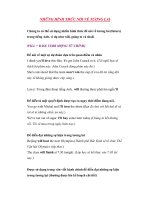Future Simple - Tương lai thường ppsx
Bạn đang xem bản rút gọn của tài liệu. Xem và tải ngay bản đầy đủ của tài liệu tại đây (50.93 KB, 3 trang )
Future Simple - Tương lai thường
FORM of Future Simple
The Future Simple has two parts: will/shall + the infinitive without 'to'.
S + will/shall + V
I will learn English.
He will swim well.
They will watch TV.
S + will/shall not + V
I will not learn English.
He will not swim well.
They won't watch TV.
Will/Shall + S + V
Will you learn English?
Will he swim well?
Will they watch TV?
The simple future refers to a time later than now, and expresses facts or certainty.
Future Simple doesn't express an attitude.
USEs of Future Simple
1. to predict a future event.
The course will start in May.
It will rain tomorrow.
2. to express a spontaneous decision (use with 'I' and 'we')
I will send you the information when I get it.
We will pay by cash in stead.
3. to express willingness or unwillingness
I will translate the email, so Mr. Smith can read it.
I will not do your homework for you.
Will you help me move this heavy table?
Will you make dinner?
A: I'm really hungry.
B: I'll make some sandwiches.
A: I'm so tired. I'm about to fall asleep.
B: I'll get you some coffee.
A: The phone is ringing.
B: I'll get it.
4. to make an invitation, a suggestion or an offer
Shall we go to the restaurant tonight? (a suggestion)
Shall I bring you something to drink? (an offer)
Will you come to the dance with me? (an invitation)
5. to give order, instruction or advice
What shall I tell the boss about this money? (an instruction)
You will do exactly as I say. (an order)
Forms of Negatives and Questions
Negative sentences and questions are formed with the auxiliary verb 'will'.
He will not/won't go to America next year
Will she get good marks in her next exam?









